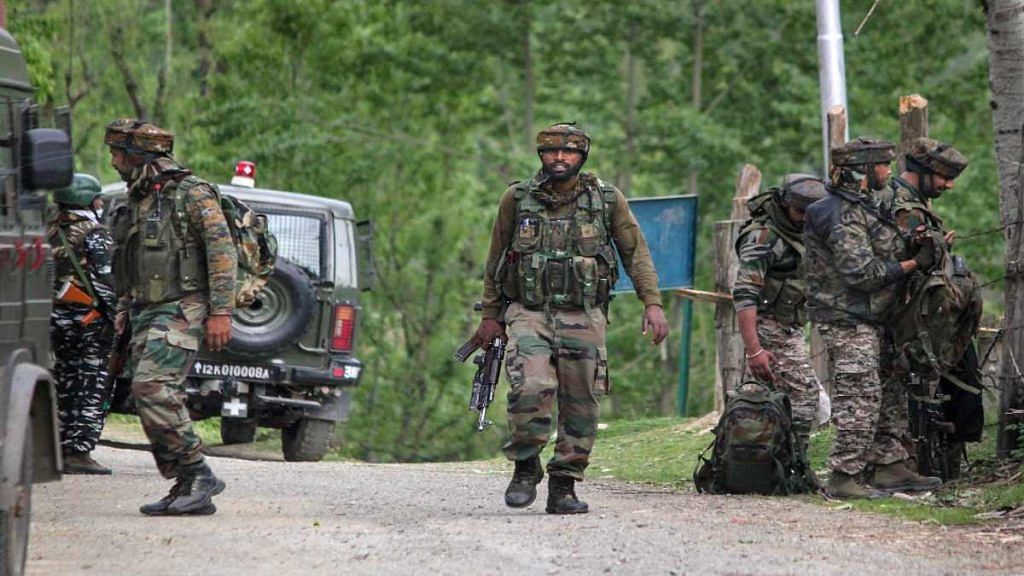New Delhi: India believes Pakistan has activated its “deep state” once again to heat up the environment in Jammu & Kashmir, taking advantage of the fact that the Modi government is focused on fighting the Covid-19 pandemic, multiple high-level sources have told ThePrint.
Despite the fact that the novel coronavirus pandemic has led countries around the world, including India and Pakistan, to go for unprecedented lockdowns, there has been relentless violence along the Line of Control (LoC) and in Kashmir, with several Indian security personnel being killed.
While the Modi government has had its hands full fighting Covid-19 and managing the ongoing lockdown, it has also been keeping a tight vigil on the spurt in ceasefire violations by Pakistan, sources said.
While India has lodged several protests with Pakistan on the ceasefire violations at the border, it has also been concerned by the uptick in terrorist activity.
Since the first week of April, five special forces personnel have died as the Army foiled an infiltration bid in the Keran sector, three CRPF personnel were killed in an attack in Handwara (a differently-abled teenager also died in the crossfire that reportedly followed the attack), and another five security men, including two senior Army officers, were killed in an encounter with terrorists in a remote Kashmir village (the terrorists were subsequently killed).
All this, the sources said, is seen by the Modi government as part of a “special plan” hatched by Pakistan to escalate such incidents.
In March alone, there were 411 ceasefire violations. This was much higher than the 267 violations last March, in the immediate aftermath of the Balakot air strikes. The air strikes, which targeted a Jaish-e-Mohammed (JeM) terror camp after the group killed 40 CRPF personnel in a terror attack in Pulwama, marked one of the most tense phases of India-Pakistan relations in recent times.
While there were 3,168 ceasefire violations by Pakistan in 2019, the number has already touched 1,547 as of 3 May.
Also Read: Instead of organising spectacles, military must focus on faultlines in Kashmir now
‘Nothing surprising’
Army sources said there was nothing surprising in the fact that Pakistan is ratcheting up terror activities even in times of coronavirus.
“Coronavirus is a concern for you and me but not for Pakistan. There are specific departments and others whose only job is to support terror against India and their work continues,” an officer said.
This was echoed by former Indian envoy to Pakistan T.C.A. Raghavan, who said one should not be surprised by Islamabad’s behaviour.
According to Raghavan, who is now the director general of the Indian Council of World Affairs (ICWA), a New Delhi-based think-tank, there are institutions in Pakistan whose only job is to target India no matter what.
“They are doing the job. There is nothing to be surprised about,” he said.
A former special secretary in the cabinet secretariat, who did not wish to be identified, said Pakistan is only trying to hide its internal affairs.
“They have never let up on their agenda and why would they do that now? This is more important to them to hide their failures on the economic front, and also coronavirus,” the officer said.
Also Read: Riyaz Naikoo — dreaded militant who ‘looted farmers and brought new ruthlessness to Hizbul’
A bid to raise global pressure on Pakistan
Meanwhile, India has decided to make a stronger case at the Financial Action Task Force (FATF) to get Pakistan blacklisted for terror financing, basing its case on the Handwara and Keran incidents as well as the emergence of new terror outfits in J&K, including The Resistance Front (TRF).
Michael Kugelman, deputy director of the Asia Programme at the Wilson Center in Washington, said Pakistan had little incentive at this moment to be stoking violence in Kashmir, pointing out out that it is under immense pressure through the FATF to crack down on terror, suffering through a serious economic crisis, and fighting a pandemic.
“Given all the pressures and crises confronting Pakistan at home right now, it has little incentive to be causing trouble in Kashmir,” he said.
However, he added that its role in the recent terror incidents could not be ruled out, especially given its “past track record and given how toxic its relations are with New Delhi right now”.
According to Ayesha Siddiqa, the London-based expert and commentator of Pakistani origin, infiltration may be taking place as it used to, but no major plan is being executed by the ISI (Pakistani intelligence agency).
On the emergence of some new terror outfits in Jammu & Kashmir, like the TRF, which India believes is an offshoot of Pakistan-based Lashkar-e-Taiba (LeT), Siddiqa said it “depends on the fact if it’s LeT in Kashmir that has changed name”.
“A lot of answers may be obtained from the US, which is keeping silent on Jaish-e-Mohammed and its chief Masood Azhar gone missing,” she added.
In February this year, Pakistan had told the FATF plenary that Azhar, a UN-designated terrorist, and his family are missing from Pakistan.
Former foreign secretary Kanwal Sibal added that the “US will not put pressure or come down on Islamabad at any cost now till it is done with the Taliban peace deal”.
“The peace deal between the Taliban and the Afghan government is already facing issues, so to bring in more complexities with Pakistan, is the last thing on US’ mind,” he added.
Also Read: TIME drew red X for Osama. But Western press humanised Riyaz Naikoo with pre-gun stories
An earlier version of this report said the Handwara attack on CRPF personnel killed two troopers. The attack killed three CRPF personnel. The error is regretted.
